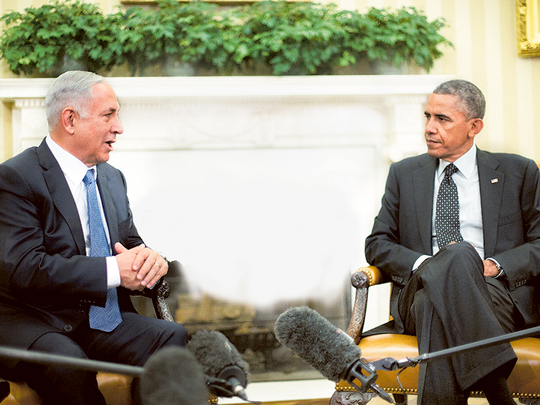
WASHINGTON: Israeli Prime Minister Benjamin Netanyahu is seizing the opportunity to speak in the US House to deliver his stern message about the danger Iran poses to his nation’s survival and voice reservations about any nuclear deal President Barack Obama and international negotiators might sign with Israel’s arch-enemy.
Netanyahu insists he is privy to emerging details of a deal and is expected to lay out specific concerns in Tuesday night’s speech to a joint meeting of Congress. It will be a last-ditch effort for Netanyahu to speak out against any agreement that would leave open a chance for Tehran to develop nuclear weapons.
The controversial speech comes just two weeks ahead of a tight national election in which Netanyahu is fighting to hold onto his job. It has already aggravated strained relations between Israel and the Obama administration and it comes as negotiators are rushing to reach a nuclear agreement by the end of the month.
“I plan to speak about an Iranian regime that is threatening to destroy Israel, that’s devouring country after country in the Middle East, that’s exporting terror throughout the world and that is developing, as we speak, the capacity to make nuclear weapons — lots of them,” Netanyahu told America’s leading pro-Israel lobby on Monday in what amounted to a warm-up to his speech to Congress.
The Israeli leader is deeply suspicious of international efforts to reach a nuclear deal. Netanyahu fears the US and its negotiating partners will give Iran too many concessions, leaving it on the cusp of developing an atom bomb.
Iran is sponsoring terrorism across the world — enveloping the world with its “tentacles of terror,” Netanyahu said.
“Imagine what Iran would do with nuclear weapons,” he added.
Netanyahu is expected to use even harsher rhetoric on Capitol Hill. The Israeli leader is personally vested in the outcome of the nuclear talks with Iran, putting him on a collision course with Obama, who has put his prestige on the line to pursue a deal.
Obama does not plan to meet with the Israeli leader while he’s in Washington, saying he wants to avoid any perception that he is meddling in Israel’s election.
Netanyahu believes that preventing a nuclear-armed Iran would be a crowning achievement — and that a bad deal would be a setback and far worse than no deal at all. While powerful, his speech to Congress also might sound a note of desperation as he appears almost out of options.
As many as 40 Democratic members of the House and more than a handful of senators are expected to skip the speech, which many have labelled a partisan political stunt. Vice-President Joe Biden, president of the Senate, also won’t be there. He’s on a trip to Central America and his seat on the dais will be filled by Sen. Orrin Hatch, president pro tempore.
Hatch said Monday that Congress should complement the prime minister’s address with the threat of more sanctions.
“I am deeply troubled that our president’s solution won’t work,” Hatch said. “This administration has opted for a policy of conciliation that does nothing to curb this growing threat. And all the while, the threat to Israel grows stronger every day.”
Netanyahu expressed frustration that his speech has created such controversy. He insisted that his speech to Congress was not meant to show any disrespect toward Obama or the Oval Office. He also said it was not intended to “inject Israel into the American partisan debate.”
But that is what’s happened.
Members of Congress who are expected to be no-shows at the speech blame House Speaker John Boehner for inviting Netanyahu without consulting with the White House or congressional Democrats. Obama’s national security adviser Susan Rice has said the speech is destructive to the fabric of US-Israeli relations.
In a pre-emptive pushback against Netanyahu’s appearances in Washington, Secretary of State John Kerry said last week that Netanyahu might be wrong about his opposition and that he should hold his criticism before he knows the details about a deal — if one materialises.
Kerry said Monday in Geneva that negotiators are seeking a verifiable set of commitments that Iran’s nuclear programme is peaceful. He said that “any deal must close every potential pathway that Iran has towards fissile material, whether it’s uranium, plutonium, or a covert path. The fact is only a good, comprehensive deal in the end can actually check off all of those boxes.”
Kerry is meeting this week with Iran’s foreign minister, Mohammad Javad Zarif.











